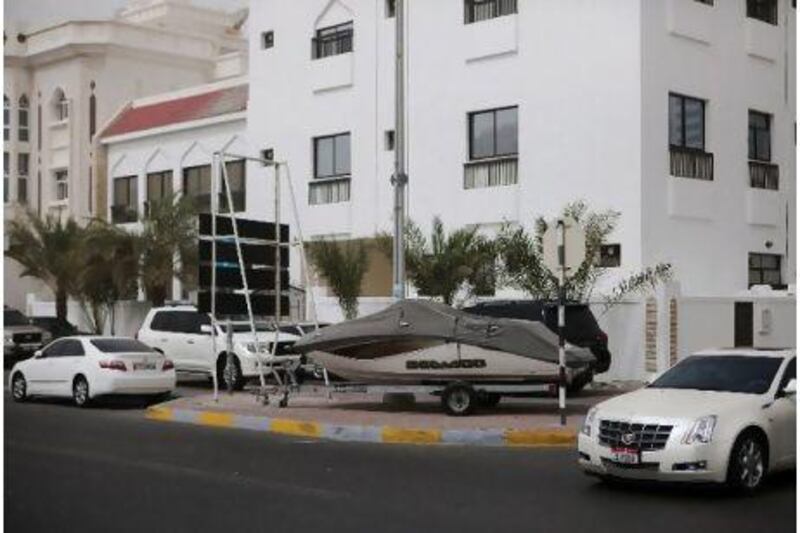ABU DHABI // Najda Street residents drove home to a surprise earlier this month– newly erected “Villa Residents Only” parking signs.
And for these residents, who say they are already enduring a severe parking shortage, this surprise was not a pleasant one.
While the signs and meters have been fixed, and the pavements have been painted, the Mawaqif scheme is not yet enforced in the area. The Department of Transport (DoT) addressed residents’ concerns and said both villa-resident parking and regular-resident parking will be implemented in the coming months.
The villa-resident parking spots will be available to villa residents around the clock. Non-villa resident permit holders, however, will have priority parking between 9pm and 8am, which residents say is ineffective since they often return from work well before 9pm.
Non-villa residents in the area often resort to parking near the Etihad and Etisalat buildings at the corner of Muroor Road and Zayed the First Street, which can mean a 30-minute walk to their homes.
“I have a four year old and seven-month-old twins. Unloading the car and getting the children out is difficult at the best of times,” said Neil Turley, a resident in the area. “Parking on Muroor
Road near the Etisalat building is possible, but even more difficult as I have to push the stroller through the villa area all the way to 6th Street [Najda Street], on the road, in the heat, with the shopping.”
Residents said they were informed that a resident permit parking system would be implemented last Sunday; however, DoT officials said it would be enforced in the second quarter of this year.
In the new system, villa residents in the area between East Road and Najda Street, and between Al Falah Street and Zayed the Second Street, will have 583 dedicated parking spots.
However, many villa residents have already blocked the parking areas surrounding their homes with orange cones and concrete blocks.
“Last month I twice parked my car on the road in a designated blue/black area, but outside a villa,” Mr Turley said. “The first time the local residents came out and insulted me and tried to make me leave. The second time I found my car vandalised.
“One police officer said he couldn’t do anything.”
Officials from the DoT, Mawaqif’s governing body, said there is no normal parking sticker in the Mawaqif system anymore. Rather, residents will be given a virtual permit. Inspectors will be equipped with advanced hand-held computers connected to a central system, and will be able to identify the vehicles by license plate and enforce the rules accordingly. However, residents say this will only be effective if there are Mawaqif inspectors actively monitoring the area.
“You can find SUVs, dustbins and even boats parked illegally in resident-only parking spots,” said Jon VanWyk, another resident in the area. “Some of these large vehicles can take up to two or three parking spots at a time and they are not fined.”
Residents said they have been trying to seek help from Mawaqif, but are consistently ignored. The most common response from the agency, they said, is that the complaint has been registered but no further action is taken.
Several groups of residents are now forming action committees to tackle these parking issues. Mr VanWyk organised The Committee of Parking and Safety, which is working on a petition addressing parking issues in the area. The group recently met with the DoT.
“They explained their strategy and they were very helpful,” Mr VanWyk said. “But they told us the signs would be up and the system running on March 20. They told us we would have no more parking problems after that.”
Mr VanWyk added that during the meeting, they were promised that the illegally parked dustbins and boat, which are taking up a number of parking spaces, would be removed in one week.
However, to date the dustbins are still in place, he said.
The number of double-parked vehicles and illegally parked cars is also creating an obstacle for emergency service vehicles. This was evident when a fire alarm went off in Mr VanWyk’s building last week, he said.
“Even the fire engines had limited access to the building as they wove their way through double-parked vehicles and a car that was parked in front of the fire hydrant.”
Meanwhile, residents continue to hope that their voices will be heard.
“I like living in Abu Dhabi, but I do not look forward to doing the same hourly drive just to find parking after working every day,” said Daniel Simon, another Najda street resident. “This is a city of cars, so make spaces for them.”






